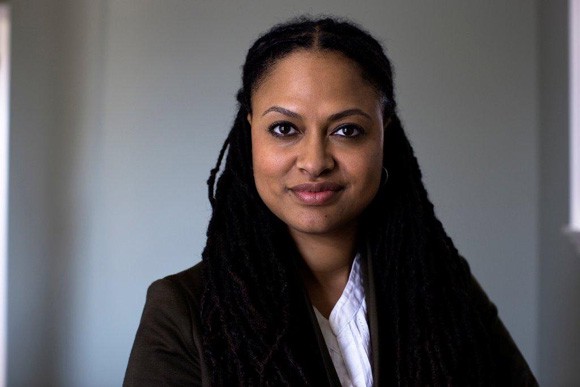Ava DuVernay was her usual candid self in a fantastic new interview with NBC News, in which she described Hollywood as “a whole bunch of locked doors,” revealed what she plans on doing as an “old lady” and explained why she created her podcast and expanded her distribution company (recently renamed Array).
When asked if she believes there are people in Hollywood “active putting up locks around [her],” the “Selma” director was honest about her situation and those of women and minority filmmakers:
“Sure, that’s all Hollywood is, is locks. A whole bunch of closed doors. Any film that you see that has any progressive spirits that is made by any people of color or a woman is a triumph, in and of itself. Whether you agree with it or not. Something that comes with some point of view and some personal prospective from a woman or a person of color, is a unicorn. Because truly the numbers that were just announced by [the USC Annenberg School for Communication and Journalism] are dismal when it comes to women filmmakers, even worse, horrible, horrific when it comes to women of color filmmakers.
“When you just imagine that there’s one type of voice that’s really being pushed to the forefront is the white male voice. In terms of cinema, it’s really clear that the rest of us are locked out. So it becomes imperative that people — audiences that want to see that, fight for it, push for it. Support it when it comes, but also artists just become really vocal. So, yeah, it’s a whole bunch of locked doors.”
DuVernay noted that she’s still not asked the same questions by the press that her white male counterparts are:
“[Journalists] sit down with me — every time at the “Selma” junket, there was a moment when that was at the forefront, but films before that. Everything I do, it’s always about the skin I’m in. I’m proud of it, it’s fine to do it, but the space that I’ve created so that the people who have the same skin I’m in can talk about what we actually do for a living.”
She started her podcast, “The Call-In,” so that black filmmakers could talk about questions other than race in the film industry:
“One of the reasons why I created the podcast called the “The Call-In” that we do through Array, because as a black artist, every time I sit down with mainstream media I’m asked about issues of race, identity and culture. No one asked what they ask my white male counterparts, which is: ‘Where do you like to put the camera?’ ‘How did you come up with that palette?’ ‘What was your conversation with your cinematographer?’ ‘How did you cast that person?’ I never get asked just film craft questions.”
She’s also using Array to bet on herself and her future:
“Our art, our artistry, our craft is a space that I had to carve for myself and the same way that I had to carve out Array because I cannot trust that ten years from now I’ll still be the flavor of the month and the studios still want to distribute my films. So I have to create an entity that is constantly growing, so that there’s always place for me to go, for people like me to go. And that’s because I’m very, very sober and clear about where I work. Where I work is in an industry that really has no regard for my voice and the voice of people like me and so, what do I do? Keep knocking on that door or build your own house? So that’s what I focus on.”
Array will help her complete her dreams for her future as an “old lady”:
“I intend to be making films until I’m an old lady. So, if God willing I get there, I need to create a paradigm for myself where I can make it regardless of whether or not they still like what I’m making. With the track I’m on, I’m probably going to make something really, really soon that they’re going to hate. Many hated “Selma”. Just because my voice and the voice of the people I come from is antithetical to so much of what Hollywood produces. I don’t think what I’m saying is in particular radical or anything, it’s just different from what they want to sell.”
[via NBC News]






